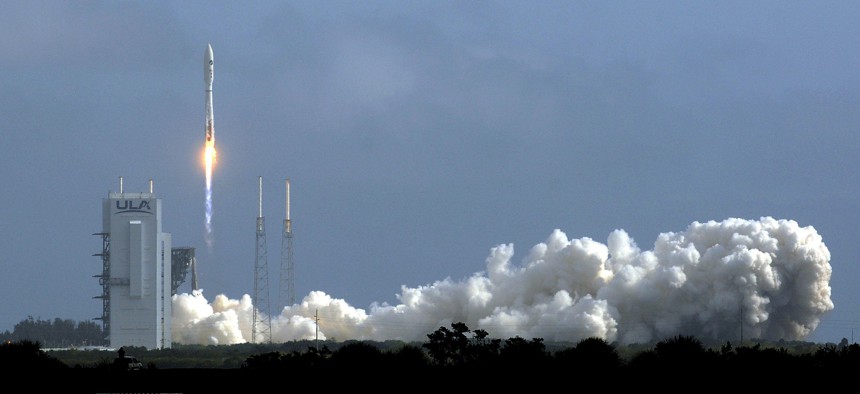Space acquisitions could see more 'discipline' from Biden pick

U.S. Space Force launches the X-37B Space Plane at Cape Canaveral, Fla. on May 17, 2020 Paul Hennessy/NurPhoto via Getty Images
Frank Calvelli, the nominee for the first ever assistant secretary of the Air Force for space acquisition and integration, said better program management was key to keeping procurement on-time and on budget.
The Biden administration's pick to be the Defense Department's first chief buyer for military space programs wants to bring a culture of discipline as a method of acquisition reform.
Frank Calvelli, who has been nominated to be assistant secretary of the Air Force for space acquisition and integration, told senators Thursday that it was key to have a technically proficient workforce – through recruiting, training and, more simply, better program management.
"I think one of the biggest things that I, if confirmed, will try to bring is discipline, and discipline in terms of just pure program management. And where I grew up. I mean the focus is purely on meeting your costs, meeting your schedule and delivering your technical commitments on time and on schedule," Calvelli told the Senate Armed Services Committee during his Feb. 17 confirmation hearing.
The former principal deputy director and deputy acquisition executive for the National Reconnaissance Office said having a "culture of a program management discipline" was important and that doing so could also allow the Space Force "to go a little bit faster."
The DOD inspector general vs. overclassification
The Senate Armed Services Committee had rapid fire hearings for a slew of key defense official nominations this week, including the Biden administration's pick to be the Defense Department's inspector general – Robert Storch.
Storch previously served as the inspector general for the National Security Agency and one of the most robust discussions during his Feb. 15 hearing was on overclassification – a trend the longtime watchdog official plans to address, if confirmed.
Sen. Elizabeth Warren (D-Mass.) noted that the Defense Department's internal watchdog had a history of redacting information that was relevant for public knowledge, such as the number of civilian casualties.
"I'm becoming very concerned about how much the Pentagon is keeping from the public through pseudo-classification. That is classifying something that doesn't need to be kept secret, classifying it just so that there's less public scrutiny," said Warren, who penned a Feb. 1 letter to the secretary of defense condemning the over classification of the Defense Department's weapons testing report.
Storch said before his tenure, the NSA's inspector general didn't do public reporting.
"We basically just had a page on the agency site, which didn't have any content. And we've worked hard to advance transparency in our oversight work there," Storch said, "so I'm going to work on that. I would work with the agency to make sure that it's done right. And if I have any problems, I absolutely wouldn't hesitate to come to the committee."
Warren continued, saying the system was "broken" and needed more oversight.
"It is a broken system. The DOD IG has looked into this as well, but many of the DOD IG's findings about these failures are completely redacted, not because they are classified, but because they are marked, quote, 'For official use only,'" Warren said.
"I suspect that more oversight from DOD IG would help us fix this broken system, but it's not going to happen unless we enhance transparency significantly….we have a right to know, the public has a right to know."
Storch also navigated a tense exchange with Sen. Josh Hawley (R-Mo.), regarding overclassification by the Defense Department and its impact on investigations by the Special Inspector General for Afghanistan Reconstruction ahead of the U.S. military withdrawal last year.
Hawley pushed for a strong commitment from Storch on overclassification, saying "the Pentagon was making it difficult for SIGAR to get any information, that DOD kept changing the metrics by which to assess the readiness of the Afghan security forces."
Storch fired back without specifically commenting on SIGAR that whether confirmed or not, he would do "everything I can in my current job, and if I'm confirmed in a future job as the DOD IG, to fighting overclassification and ensuring that all appropriate information is out."






